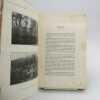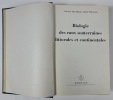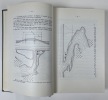-
Type
Autograph (1)
Book (2890)
Drawings (1)
Magazine (54)
Photographs (2)
-
Latest
Last 24h (1)
Last 3 days (6)
Last month (8)
Last week (15)
-
Language
English (2)
French (2944)
Italian (2)
-
Century
17th (2)
18th (36)
19th (272)
20th (1281)
21st (85)
-
Countries
Belgium (353)
Brazil (1)
Canada (7)
Côte d'Ivoire (5)
Denmark (215)
France (2055)
Italy (6)
Switzerland (306)
-
Syndicate
ALAC (7)
CLAM (1)
CLAQ (1)
ILAB (805)
NVVA (132)
SLACES (132)
SLAM (421)
Les portes de la lumière - D'où venons-nous, où allons-nous ? - L'homme, cet être hybride
Presses de la Nouvelle Imprimerie Laballery et chez l'Auteur Louis Brouwer Malicorne sur Sarthe, 72, Pays de la Loire, France 2000 Book condition, Etat : Bon broché, sous couverture imprimée éditeur blanche, encadré de jaune grand In-8 1 vol. - 433 pages
édition de 2000 Contents, Chapitres : Louis de Brouwer est un médecin français et essayiste. - De Brouwer se présente comme un spécialiste en biologie moléculaire et en homéopathie. Il a été vice-président de la Ligue internationale « médecins pour l'abolition de la vivisection » (LIMAV). Il est membre de l'International Committee on Health. Il est connu pour son apport à la controverse sur la vaccination. (source : Wikipedia) couverture légèrement jaunie avec d'infimes traces de pliures aux coins des plats, intérieur propre, légère trace d'étiquette sur le haut de la dernière page, cela reste un bon exemplaire
Contribution a l'étude de la phagocytose
Bruxelles, 1896 66pp.+ 3 planches hors-texte, Mémoire présenté à la classe des Sciences dans la séance du 7 avril 1894, publié dans et extrait de "Mémoires couronnés et mémoires des savants étrangers publiés par l'Académie Royale des sciences, des lettres et des beaux-arts de Belgique" Tome LIV (54), in-4
Le Problème de l'extinction des groupes étudié chez les rudistes
Editions de la revue scientifique Revue Scientifique Revue 1948 In-4, (24x32 cm), dos agrafé, 4 pages, extrait du n° 3289, 15 janvier 1948, fascicule 2 de la 86e année de la Revue scientifique, pages 83 à 86, ex-libris de Giot ; plats légèrement insolés, bon état. Livraison a domicile (La Poste) ou en Mondial Relay sur simple demande.
Le vieillissement du monde vivant. Préface de Maurice Caullery
P., Plon, 1941, un volume in 8, broché, couverture imprimée (premier plat de couverture décolloré),(2), 6pp., 385pp., 10 planches hors texte, 147 figures dans le texte
---- Nouvelle édition REVUE ET AUGMENTEE ---- Les espèces disparues - Les espèces stationnaires ou dégradées - Les causes générales de l'extinction des espèces disparues - Les dérèglements du métabolisme et la croissance différentielle des organes - Les troubles cellulaires héréditaires et la dégénérescence des espèces - Le gigantisme cellulaire - Stérilité et fécondité - La sénescence des espèces végétales - La fin de l'évolution - ETC**1632/VI-CAV/F3?
Le vieillissement du monde vivant.
Couverture souple. Broché. 385 pages. Couverture légèrement défraîchie. Légère mouillure en marge aux dernières pages.
Livre. Editions Plon Masson, 1943.
Le vieillissement du monde vivant
Plon Paris, Librairie Plon 1945. In-8 broché de 385 pages + table. 10 gravures horstexte et 147 dans le texte. Préface de Maurice CAULLERY.Bel exemplaire
Toutes les expéditions sont faites en suivi au-dessus de 25 euros. Expédition quotidienne pour les envois simples, suivis, recommandés ou Colissimo.
Le vieillissement du monde vivant , préface de Maurice Caullery
Plon & Masson Malicorne sur Sarthe, 72, Pays de la Loire, France 1945 Book condition, Etat : Bon broché grand In-8 1 vol. - 385 pages
10 gravures et 147 ht. nouvelle édition revue et augmentée Contents, Chapitres : espèces disparues, stationnaires ou dégradées - causes générales de l'extinction des espèces disparues - acromégalie dégénérative et sécrétions calcaires - dérèglements du métabolisme et croissance différentielle des organes - troubles cellulaires héréditaires et dégénerescence des espèces - gigantisme cellulaire - dentition et loi de Ribot - dégradation des instincts des espèces animales - dégénérescence des formes supérieures de l'intelligence - stérilité et fécondité - sénescence des espèces végétales - fin de l'évolution
Le vieillissement du monde vivant. Préface de Maurice Caullery.
Paris, Plon/Masson, 1941, in-8 broché, VI + 355 pp, avec 147 figures hors-texte et dans le texte. 2e éd. Couverture légèrement ternie, sinon bon état.
[Paul Lechevalier] - DEFLANDRE, G. (dir.) [ DEFLANDRE, Georges (1897-1973) ] ; Collectif
Reference : 31141
(1928)
Annales de Protistologie. Recueil de Travaux originaux concernant la Biologie & la Systématique des Protistes (5 Tomes. Années 1928 à 1936 complètes) Tome 1 : 1928 ; Tome 2 : 1929 ; Tome 3 : 1930-1931 ; Tome 4 : 1934 ; Tome 5 : 1936 [ Journal on Protists, Eukaryotic microorganisms : Protozoa, protophyta, ... ]
5 Tomes en 2 vol. in-8 reliure demi-percaline rouge, Paul Lechevalier, Paris, 1928-1936, 223-221-297 pp. et 205-360 pp. avec nomb. planches hors texte.Rappel du titre complet : Annales de Protistologie. Recueil de Travaux originaux concernant la Biologie & la Systématique des Protistes (5 Tomes. Années 1928 à 1936 complètes) Tome 1 : 1928 ; Tome 2 : 1929 ; Tome 3 : 1930-1931 ; Tome 4 : 1934 ; Tome 5 : 1936 [ Journal on Protists, Eukaryotic microorganisms : Protozoa, protophyta, ... ]
Rare série complète. Etat très satisfaisant (rel. lég. frottées, qq. annotations). pour ces annales, publiées sous la direction du naturaliste et micropaléontologue, Georges Deflandre.
Monographie du genre Trachelomonas Ehr. [ Livre dédicacé par l'auteur ]
1 vol. in-8 br., Imprimerie André Lesot, Nemours, 1926, 162 pp. et 15 planches
Envoi de l'auteur. Etat très satisfaisant (qq. annotations)
Annales et exercices de microbiologie générale
Doin Biosciences et techniques Broché 1994 In-8 (17 x 24 cm), broché, 72 pages ; très bon état général. Livraison a domicile (La Poste) ou en Mondial Relay sur simple demande.
Du rôle de la mémoire dans nos conceptions métaphysiques, esthétiques, passionnelles, actives
Paris, Alcan 1920 198pp., 1e édition (et seule ?), dans "Bibliothèque de philosophie contemporaine", br.orig., dos peu réparé, bon état
Le corps entre biologie et psychanalyse. Essai d'interprétation comparée. Préface de François Dagognet.
1986 Paris, Payot, 1986, in 8° broché, 270 pages ; cachets.
...................... Photos sur demande ..........................


Phone number : 04 77 32 63 69
Description des coquilles fossiles de l'argile de Basele, Boom, Schelle, etc.
Bruxelles, 1838 37pp.+ 4 planches hors-texte, (Mémoire lu à la séance du 4 février 1837), publié dans et extrait de "Nouveaux mémoires de l'Académie Royale des sciences et belles-lettres de Bruxelles" Tome XI (11, 1838), in-4
Recherches ornithologiques dans les provinces du Tranninh (Laos) de Thua-Thien et de Kontoum (Annam) et quelques autres régions de l'Indochine française III
Paris, Société nationale d'acclimatation de France, 1927. In-4, XII-216 pp. XIV pl., broché, couverture originale imprimée (petites taches et déchirures à la couverture, pâles rousseurs).
Édition originale de cette monographie zoologique des oiseaux d'Indochine. Elle est illustrée de 14 planches, certaines en couleurs et de cartes dans le texte. Exemplaire non coupé. * Membre du SLAM et de la LILA / ILAB Member. La librairie est ouverte du lundi au vendredi de 14h à 19h. Merci de nous prévenir avant de passer,certains de nos livres étant entreposés dans une réserve.
La parthénogénèse naturelle et expérimentale
Ernest Flammarion, éditeur à Paris , Bibliothèque de Philosophie Scientifique Malicorne sur Sarthe, 72, Pays de la Loire, France 1913 Book condition, Etat : Bon relié, pleine toile noir moderne, simili-cuir, plat supérieur conservé In-12 1 vol. - 342 pages
25 figures dans le texte en noir et blanc 1ere édition, 1913 Contents, Chapitres : 1. Préliminaires : Parthénogénèse naturelle - Phénomènes cytologiques de la maturation dans la parthénogénèse - Généralités sur la parthénogénèse expérimentale - Quelques notions sommaires sur le développement des échinodermes et de la grenouille - 2. Les facteurs de la parthénogénèse expérimentale : Facteurs mécaniques - Facteurs physiques, lumière, électricité, chaleur, rayons de radium, pression osmotique, propriétés des solutions - Facteurs chimiques - Actions des ions dans les solutions - Les ions dans la parthénogénèse - Substances vivantes empruntées à l'organisme - 3. Les grandes théories de la parthénogénèse : Théorie de Loeb, exposé et critique - Electrisation de contact, tension superficielle, état colloïdal - Théorie de Delage - R.S. Lillie et les théories fondées sur la perméabilité de la membrane cellulaire - Théorie de Bataillon - Conclusion - Tableau des espèces présentant une parthénogénèse naturelle - Tableau des résultats obtenus dans la parthénogénèse expérimentale - Yves Marie Delage, né le 13 mai 1854 à Avignon et mort le 7 octobre 1920 à Sceaux, est un zoologiste français. - Son père est fonctionnaire, Delage est le cadet dune fratrie de cinq enfants. Il étudie à Châtellerault où il obtient son baccalauréat de sciences (1871) et de lettres (1872). Il poursuit ses études à Poitiers puis à Paris. En 1875, il se marie avec Louise Lebrun, fille dun capitaine en retraite, et dont il aura deux enfants (Valentine et Abel). Il reçoit sa licence de sciences naturelles (1878), un doctorat de médecine (1880) et de sciences (1881). Il est préparateur au laboratoire de zoologie de lÉcole pratique des hautes études en 1878. Il est nommé préparateur à la Station biologique de Roscoff, chargé de conférences à la faculté des sciences de Paris en 1881, et, lannée suivante, maître de conférences. En 1883, il est chargé de conférences à la faculté des sciences de Caen et dirige la station zoologique de Luc-sur-Mer. Il revient à Paris en 1885 et est chargé de cours à la faculté des sciences, puis, lannée suivante, est professeur titulaire. Il dirige également le laboratoire de recherche en zoologie expérimentale (1889). En 1901, il dirige la Station biologique de Roscoff. En 1902, Delage prend part à un débat sur le Suaire de Turin auprès de l'Académie de sciences à Paris, lors duquel il argumente en faveur de son authenticité, estimant la probabilité qu'il en soit autrement à 1 sur 10 milliards. Delage crée et dirige la revue LAnnée biologique en 1895, il devient membre de lAcadémie des sciences en 1901 et reçoit la médaille Darwin en 1916. Il préside la Société zoologique de France en 1900 et est membre de diverses sociétés savantes. Il est fait officier de la Légion d'honneur et reçoit un titre de docteur honoris causa des universités de Cracovie, dAberdeen et de Genève. Il est lauteur de nombreuses publications dont LAppareil circulatoire des crustacés édriophalmes (1881), Évolution de la sacculine (1884), Fonction des canaux demi-circulaires et otocystes des invertébrés (1887), Embryogénie des éponges (1892), LHérédité et les grands problèmes de la biologie générale (1895), Traité de zoologie concrète (six volumes, 1896-1903), Les Théories de lévolution (1909) et La Parthénogénèse naturelle et expérimentale (1913). Sous le pseudonyme de T. Henvic, il fait paraître des poèmes et des nouvelles psychanalytiques. (source : Wikipedia) reliure récente en très bon état bien qu'ordinaire, en simili-cuir noir, dos muet, plat supérieur conservé, intérieur propre mais papier un peu jauni sans gravité (non cassant), le coin des 4 dernières pages (table des matières) a été consolidé très proprement avec du papier relieur, cela reste un bon exemplaire - reliure moderne ordinaire, muette (sans indications)
La Parthénogénèse
Ernest Flammarion, coll. « Bibliothèque de Philosophie Scientifique » 1913 In-12 demi chagrin noir, dos à 5 faux-nerfs. titre doré. 18,7 cm sur 12,2. Tranche supérieure dorée. 342 pages. Couvertures et dos d’origine conservés. Bon état d’occasion.
Bon état d’occasion
La Parthénogénèse naturelle et expérimentale. Collection Bibliothèque de Philosophie scientifique.
Paris, Flammarion 1913, 185x115mm, 342pages, broché. Bon état.
Pour un paiement via PayPal, veuillez nous en faire la demande et nous vous enverrons une facture PayPal
Biologie des eaux souterraines littorales et continentales
Paris, Hermann, coll. « Actualités scientifiques et industrielles » 1960 In-8 24,5 x15 cm. Reliure éditeur toile verte, 254 dessins, plans et photos en noir et blanc dans et hors texte, et 1 carte repliée hors texte, appendice, bibliographie, index des nomns d’auteurs et des espèces. Exemplaire en bon état.
Bon état d’occasion
"Etude du taux de prothrombine par les droites de corrélation de Thivolle. Revue belge de pathologie et de médecine expérimentale; Extrait tome XXI, N° 5, janvier 1952. "
"Bruxelles, Editions ""Acta Ledica Belgica"", 1952." 16 x 24, 15 pp., quelques graphiques, broché (agrafé), bon état.
Exposé d'une méthode. Applictions biologiques
La Colombe 1961, In La Colombe 1961, In-8 broché, 140 pages non coupées. Bon état
Toutes les expéditions sont faites en suivi au-dessus de 25 euros. Expédition quotidienne pour les envois simples, suivis, recommandés ou Colissimo.
Histoire de la Biologie. Collection Nouvellle Bibliothèque illustrée des Sciences et Techniques.
Lausanne, Editions Rencontre 1965, 273x173mm, 104pages, cartonnage illustrée de l’éditeur.
photos n/b, Pour un paiement via PayPal, veuillez nous en faire la demande et nous vous enverrons une facture PayPal
L'Institut Pasteur. des origines à aujourd’hui
France-Empire 1962 In-8 cartonnage éditeur sous jaquette 21 cm sur 13,7. 366pp. Bon état d’occasion. Livre de Bibliothèque avec cachet Hors Inventaire.
Bon état d’occasion
Pasteur et la microbiologie.
Couverture souple. Broché. 128 pages.
Livre. Editions P.U.F (Collection : Que sais-je N° 467), 1967.
Pierre Belon, naturaliste
Le Mans, imprimerie Monnoyer, 1926. In-8, 270 pp., broché, couverture originale illustrée (très légère insolation).
Édition originale de cet ouvrage regroupant une biographie et une analyse des divers champs d'études qui intéressaient Belon en histoire naturelle. L'ouvrage est composé de 8 chapitres, chacun abordant un sujet d'étude comme l'ornithologie, l'ichtyologie ou la botanique. Bon exemplaire. Voir photographie(s) / See picture(s) * Membre du SLAM et de la LILA / ILAB Member. La librairie est ouverte du lundi au vendredi de 14h à 19h. Merci de nous prévenir avant de passer,certains de nos livres étant entreposés dans une réserve.
 Write to the booksellers
Write to the booksellers

















